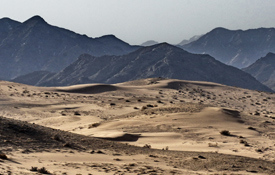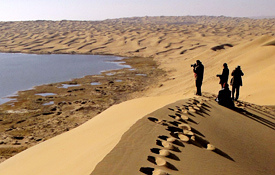|
 |
 |
|
TRANSFORMED LANDSCAPES: Campaigns to seed new pastures in Alxa's mountainous areas over the past two decades have slowed down the growth of deserts by fixing sand dunes (LI XIN) |
A VISUAL FEAST: The Tengger Desert in Alxa, Inner Mongolia Autonomous Region, is a major source of the sandstorms that plague north China in spring (LI XIN) |
SEE has evolved over the years from trying to implement its own projects, such as planting trees in the desert, toward acting as a foundation and discussion group for non-governmental conservation efforts. It adopts a human-oriented approach, which aims to allow the recovery of local saksaul forests and pastures by adapting local farmers' lifestyles to reduce deforestation and overgrazing.
Since its establishment, SEE has spent more than 3.3 million yuan ($523,593) to finance 13 scientific field studies on local desertification prevention and invested nearly 19 million yuan ($3.01 million) in eco-friendly livelihood projects in 15 villages.
These efforts have resulted in the conservation of 49,333 hectares of pastures, 165,333 hectares of saksaul forests and 4.65 million cubic meters of water.
The organization has also established a local volunteer team of more than 100 members, published a series of brochures on native flora and fauna and filmed a documentary recording Alxa's biodiversity.
In 2008, SEE organized a study trip to the United States for 19 of its members. During the 10-day trip, the delegation visited 15 NGOs, including the Hewlett Foundation, Rockefeller Foundation, Ford Foundation and The Nature Conservancy (TNC).
"When I first went to the United States 14 years ago, it was to learn how to make money. This time, I went to learn how to spend money for the environment," said Vanke's Wang, who took part in the trip.
At the end of the year, SEE set up a foundation, which has provided 8.7 million yuan ($1.38 million) to 64 environmental projects that embrace SEE's agenda and are committed to the principles of "cooperation" and "win-win" solutions.
Since 2005, SEE has cooperated with TNC, a charitable environmental organization that works to preserve the plants, animals, and natural communities, to give out SEE-TNC Ecological Awards to conservationists, reporters, lawyers and NGOs that have made outstanding contributions to environmental protection. More than 100 organizations and individuals have so far received monetary prizes totaling 3.6 million yuan ($571,175).
SEE also sponsors a "green leadership" training program, which has so far benefited 57 environmental NGO leaders from 30 organizations. Another training program designed for college environmental groups attracted 708 trainees from 94 campus groups.
"The financial resources we have mobilized are far too small to control desertification in China. SEE's role is mainly as an organizer of awareness campaigns and source of seed money while the majority of investment comes from the government," Ren said. "The ideal situation is that NGOs, the government and people threatened by desertification pool their resources and work together."
According to China Youth Daily, Liu made more than 100 calls to his fellow business executives to recruit members during SEE's preparatory stage. Many of the organization's founding members were badgered into joining the cause by Liu or Liu's friends. SEE's founding members, some of whom were from Singapore and China's Hong Kong and Taiwan, managed assets totaling 2 trillion yuan ($317.31 billion).
While some joined the organization out of their genuine concern for China's environmental conditions and the limits that the country's polluted air and water, degraded soils and dammed rivers would place on its economy, others regarded membership as simply a golden opportunity to network.
"You cannot blame those people," said Yang Peng, former Secretary General of SEE. "It wasn't meant to be a club of saints. Those who cannot identify with its core tenets will leave eventually."
Yang, who was an official with the Ministry of Environmental Protection before working for SEE, said joining SEE also helped some billionaire members change their lifestyles. Yang himself gave up wearing cashmere clothing after he learned that one cashmere sweater requires the wool from 10 goats, which need to feed on 66.7 hectares of pasture.
Zhang Yue, an active SEE member and Chief Executive Officer of Broad Air Conditioning based in Changsha, Hunan Province, with a personal fortune estimated at $850 million in 2010, gave up traveling in his private jets in 2005 after reading that the carbon dioxide emitted during a 3,000-km trip by a private jet is equivalent to the amount of carbon dioxide absorbed by eight large trees over 60 years.
| 